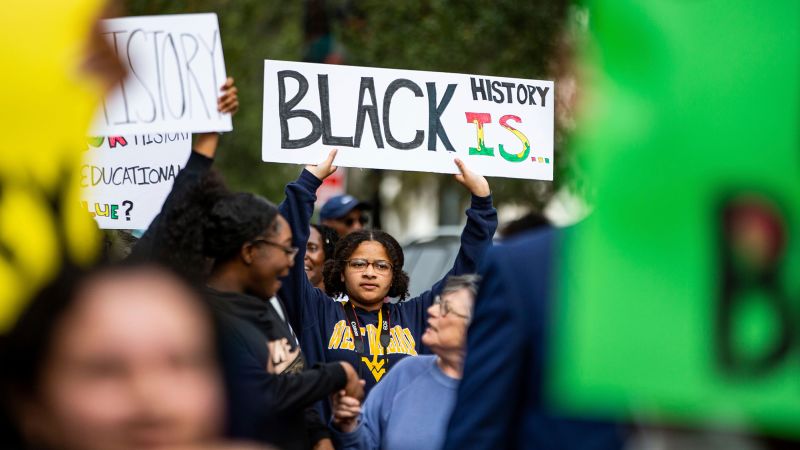
A version of this story appears in CNN’s What Matters newsletter. To get it in your inbox, sign up for free here.
CNN
—
There is something weird in the fact that the College Board is now the latest bogeyman for Florida Gov. Ron DeSantis’ efforts to purge his state’s education system of “woke” indoctrination.
The nonprofit also owns the SAT test, which has long been criticized as a key barrier to making college campuses more diverse.
DeSantis has made targeting diversity programs a main point of his policy agenda. That effort has set off a public battle with the College Board, which owns and administers the Advanced Placement program, over its plans to offer a new AP course on African American studies.
RELATED: Ron DeSantis can now make his agenda a reality ahead of a possible 2024 announcement
Read the details on that public spat from CNN’s Tina Burnside and Gregory Clary. And learn more about the controversial proposed AP African American studies course curriculum from CNN’s Nicole Chavez.
The short version is that Florida demanded changes to the course. After first seeming to strip back the portions that Florida found objectionable, the College Board later hit back at Florida, accusing the state department of education of “slander” and documenting months when differences over the curriculum could have been addressed by Florida, but were not.
DeSantis suggested at a news conference Tuesday that Florida could move on from the College Board altogether.
“Who elected them? Are there other people that provide services? Turns out there are,” he said, suggesting the International Baccalaureate as an example of an alternative.
More than a third of US public high school graduates in the class of 2021 took at least one AP class, according to data from the College Board. In Florida, students from 733 public high schools took an AP test, per College Board data.
Florida did not waive standardized tests when it could have; has a larger effort to target diversity
It’s worth noting here that there is one area where Florida has shown steadfast support for the College Board: by requiring SAT scores.
When many state universities around the country made SAT and ACT tests optional for college admissions during the height of the Covid-19 pandemic, Florida did not. (The ACT is administered by a nonprofit organization that competes with the College Board.)
Back then, DeSantis was intent on putting Florida at the forefront of fighting Covid-19 restrictions and trying to force school districts to stay open. There were no exceptions to waive the SAT or ACT, even though students were struggling to get access to tests.
Now, moving on to purge diversity efforts, he has demanded the names of staff and programs involved with diversity at public colleges and universities. And he’s led the charge to crack down on what school districts can teach on the issues of race and gender.
Standardized tests are frequently cited as a barrier
DeSantis’ moves against diversity programs are the polar opposite of how critics of the SAT view the test.
Big public universities in California that have been barred by voters from applying affirmative action to diversify campuses have ditched the SAT and ACT.
Many prestigious private universities have made the tests optional. Harvard University, for example, has made them optional through 2026.
If, as expected, the Supreme Court outlaws the consideration of race in any admissions programs, moving away from tests is a salve suggested by the American Civil Liberties Union.
“Universities will still be able to stop considering factors that have been proven to create unjustifiable barriers for historically underrepresented students of color,” is the suggestion in a post on the ACLU’s website. “For example, many schools have already stopped considering (the) SAT and the ACT.”
These are obviously separate issues – Florida’s dislike of the AP African American studies curriculum and the separate criticism of standardized tests as barriers to inclusion.
But they both feed into the large role the College Board – which advertises itself as a nonprofit but in some years generates more than $1 billion in revenue and pays top executives seven-figure salaries – plays in American education.
The College Board has frequently been accused of a lack of transparency, but it does explain on its website that representatives from its 6,000-plus member organizations – including colleges, universities, secondary schools and school districts – appoint delegates to serve on its three national assemblies.
The College Board did not respond to a request for comment for this story.
The College Board acts like a business
Jon Boeckenstedt is the vice provost for enrollment management at Oregon State University. He recently wrote for Slate that we should not forget that the College Board, while a nonprofit, acts very much like a business – something he learned when he sat on College Board advisory boards more than a decade ago.
In a phone conversation, he said it is both a feature and flaw of the US educational system that there is no national curriculum.
“The good thing is that states and even local entities are allowed to sort of mold and create the curriculum that is most relevant to their citizens and their population,” Boeckenstedt said.
“On the other hand, it makes it extraordinarily difficult for us as a nation to figure out whether students are learning the things we think they should be learning, and we have no real way to assess or even compare learning for school districts, across different schools and across different populations,” he said.
Monopolistic tendencies
As a result, the College Board has filled the vacuum and, according to Boeckenstedt, “is sort of entrenched in circular business processes that feed off each other and help it generate more of its monopoly status.”
He said states should take some power back from the College Board. For instance, he’d like to see states gather and share the information of their prospective college students with universities rather than allowing the College Board to license that information to schools and generate revenue with it.
Boeckenstedt also argued that teachers are so focused on preparing students for the AP tests that they feel constricted from veering off the curriculum.
John Moscatiello, founder of the AP test prep company Marco Learning, told me a lot of teachers are frustrated by aspects of the AP program, but also respect it for the breadth of input and knowledge that are put into the course outlines.
He said the College Board has responded to criticism, restoring some years of history to its world history classes and adding a math course to address the problem of students not being ready for college-level math.
Who should write the curriculum?
“Does Ron DeSantis get to tell the College Board what the national curriculum should be? That doesn’t seem right,” Moscatiello told me in a phone interview. “But does the College Board, an unelected body and a not-for-profit, get to tell the people of Florida what goes into a course? That’s the contradiction that everyone’s struggling with.”
The great danger he fears is that the entire program falls victim to the culture wars.
He pointed out that governors in states like Illinois, California and New Jersey have declared that they are pro AP African American studies and will expand the course. What’s currently offered nationwide could grow in blue states and be excised from some red states.
“The College Board may find itself in a situation that the AP program is perceived of as a blue state product or set of services, not for everyone – and this is a nightmare.”





